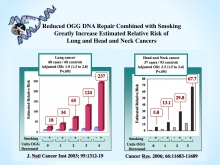Reduced activity of the DNA repair enzyme OGG1 is associated with increased risk of lung cancer and head and neck cancer
We developed an epidemiology-compatible, robust and reproducible assay for the activity of the DNA repair enzyme 8-oxoguanine DNA glycosylase 1 (OGG1). This enzyme removes from DNA the lesion 7, 8-dihydro 8-oxoguanine (8-oxoG), a highly mutagenic lesion caused by oxidative stress, tobacco smoke, radiation and metabolism. We have conducted a case-control study using this assay, and found that reduced OGG1 activity is associated with increased lung cancer risk. We have shown that OGG activity in the blood correlates with activity in the lung, indicating that it can be used as a surrogate for the lung. Moreover, we have evidence to indicate that the cancer itself does not affect OGG1 activity in the blood. Taken together these indicate that low OGG1 DNA repair activity is a risk factor for lung cancer. Moreover, smokers with low OGG1 had an extra-high estimated risk to develop lung cancer.
Similarly, low OGG was found to be a risk factor in head and neck cancer. The OGG test was recently semi-automated to increase its throughput, in preparation for large-scale prospective epidemiological/clinical studies.
References:
DNA repair activity for oxidative damage and risk of lung cancer.
Paz-Elizur T, Krupsky M, Blumenstein S, Elinger D, Schechtman E, Livneh Z. J Natl Cancer Inst. 2003 Sep 3;95(17):1312-9.
Reduced repair of the oxidative 8-oxoguanine DNA damage and risk of head and neck cancer.
Paz-Elizur T, Ben-Yosef R, Elinger D, Vexler A, Krupsky M, Berrebi A, Shani A, Schechtman E, Freedman L, Livneh Z. Cancer Res. 2006 Dec 15;66(24):11683-9.
DNA repair of oxidative DNA damage in human carcinogenesis: potential application for cancer risk assessment and prevention.
Paz-Elizur T, Sevilya Z, Leitner-Dagan Y, Elinger D, Roisman LC, Livneh Z. Cancer Lett. 2008 Jul 18;266(1):60-72. Epub 2008 Apr 18. Review.
